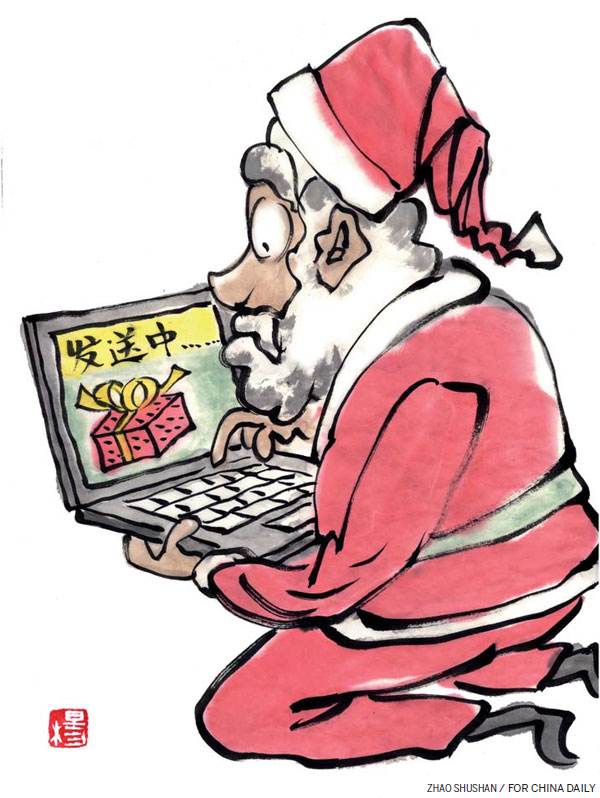E-commerce holds plenty of surprises

Entrepreneurs set to stir up online shopping sector, led by rising generation of vigorous, creative Chinese talent
As we enter the new year, it is always an appropriate time to look ahead to industry developments, especially in those so-called strategic industries that are growing most quickly and significantly.
Perhaps no industry can lay more claim to this "strategic" status than e-commerce. During 2016, global retail e-commerce sales reached an amazing $1.9 trillion (1.8 trillion euros; 1.6 trillion). Double-digit growth continued and is forecast to continue until 2020 at which time worldwide sales are estimated at a staggering $4 trillion.
Key to this inexorable rise has been the parallel propulsion of the Chinese e-commerce industry, where giants such as Baidu, Alibaba and Tencent have certainly made their mark on the world stage.

One of the key consumer trends that is set to continue throughout 2017 is the preference for e-commerce engagement via mobile phone rather than personal computer. It is estimated that retailers that cannot reach consumers via mobile or tablet may be, in effect, ignoring as much as half their customer base.
One such eminent e-commerce player in recent years, Alibaba, has certainly set up effective mobile engagement with its customer base. Over 85 percent of Alibaba's sales during this year's Singles Day were the result of transactions on mobile devices.
Clearly, 2017 is a year during which websites will have to be as mobile-compatible as possible. Furthermore, a mobile-first approach appears absolutely essential when building online consumer experience.
The e-commerce payment landscape could continue to change during 2017. Card payment security continues to concern many, and alternative payment methods and platforms such as Alipay, PayPal and Amazon Pay are likely to gain considerable market share.
Ease of mobile payment will also become an increasingly important factor affecting online consumer decision making. Once again Chinese e-commerce players are set for further gains here with advanced payment systems. Chinese e-commerce giants Tencent (messaging app. with payment via WeChat) and Alibaba (payment via Alipay) are both perfect examples.
Speed and cost of delivery will also play an increasingly important role in customer decision-making when purchasing online. Most retailers now set next-day delivery as standard. Long gone are the days where 5- to 7-day delivery was the norm. Customers demand free and increasingly rapid delivery.

We may witness a move toward same-day delivery during 2017, where retailers will work closely with their distribution partners in an attempt to hit this difficult target.
Further progress toward personalizing the online shopping experience will no doubt feature in 2017. Retailers, via their online platforms, should be able to make better use of previous order patterns and additional online interaction to personalize the shopping experience. Consumer culture around the world is now characterized by a need for self-expression and, therefore, any move toward further personalization of the online experience should meet with success.
In terms of the design of e-commerce sites - vitally important when attracting new potential customers - pictorial presentation appears to be the major trend. Too many words may well confuse consumers who are more interested in an emotional shopping experience and purchasing products that enhance their lifestyle emotionally too. Visual appeal and colorful images that create consumer engagement should dominate any e-commerce design/redesign.
Very important, it is crucial that retailers do not forget the importance of customer service across all channels. Recently, major e-commerce players such as Ebay and Amazon have moved to work even closer with their partners in order to ensure ever-higher levels of customer service. Consumers now demand excellent service.
Consumers also value stimulation and eschew any form of mundane, routine lifestyle. It is therefore expected that increasing flash sales will continue to work well. Such sales fit very well with new, unpredictable consumer lifestyles and shopping behaviors.
Those e-commerce players who respond quickest to major, surprising news and events with a suitable flash sales events will gain significantly and bond much more effectively with their customer base.
So where do these e-commerce trends leave China's growing e-commerce industrial sector? Are Chinese e-commerce industry players well-placed to take advantage of these trends, or will their emergence be stifled somewhat?
A glance at some of the recent initiatives that have taken place with some of the major Chinese e-commerce players suggests that an even stronger performance is to be expected during 2017.
Tencent perhaps typifies the Chinese e-commerce sector. Earlier this month it announced a strategic partnership with Starbucks. Tencent's messaging app, WeChat, will soon extend its payment service across Starbucks stores in Chinese mainland. In addition, Starbucks will present itself as a partner in the launch of a new "social gifting" feature of WeChat.
Clearly, Tencent understands the importance of the trends discussed above, especially ease of payment and enhancing the emotional benefit of the online experience.
Competition among China's major e-commerce companies will also likely intensify during 2017, which can only be a good thing for consumer choice and industry quality standards.
Tencent rival Alibaba looks set for a successful 2017. Earlier this year it very smoothly integrated the online video company Youku Tudou, thereby enhancing the overall market offering. Alibaba has also continued to increase considerably its content investment in the digital media segment. Its investments have included acquisitions in the areas of film, music and games. The Alibaba online platform has also been strengthened significantly from the formation of relationships with other investment companies.
The international investment community is also bullish on Baidu, China's major internet search engine. Many expect Baidu's share price to outperform the market.
However the really exciting possibility for 2017 is the likely emergence of a number of smaller, agile e-commerce companies. China is also well placed here, with a high-tech-led entrepreneurial culture spreading across the mainland. Younger generations, self-confident and savvy, could power China's e-commerce sector to new, unimaginable heights in 2017 and beyond.
We should also see e-commerce companies focusing more on specific industries, which should allow for a more personalized and enhanced customer experience. Smaller Chinese e-commerce player Mogujie is a typical example, where the company focuses almost exclusively on online fashion consumption.
The name Mogujie literally means "Mushroom Street" in English. The company was co-founded in 2011 by a former engineer at Alibaba.
Mogujie started out as a social site similar to Pinterest, where users create photo collages of fashion items. It evolved into a shopping site where the company derives income from merchants paying commissions.
Expect more from Mogujie and other e-commerce companies that are similarly small and entrepreneurial.
Overall, expect 2017 to be a year in which the e-commerce industry becomes more fragmented. Even the strongest, most entrenched e-commerce providers may experience unprecedented competitive threats from newly formed, entrepreneurial and internationally fearless e-commerce startups.
In recent years it has been the Chinese e-commerce giants such as Tencent, Alibaba and Baidu whose emergence surprised many. But in years to come, it will be Chinese e-commerce entrepreneurs who will create even more surprises around the world.
The most important trend, which will become crystal clear during 2017, is the consumer need for innovative, industry-focused e-commerce companies. Coupled together with a restless consumer who distrusts larger e-commerce providers and values stimulation, the door is wide open for entrance of e-commerce startups.
Expect younger Chinese generations to grasp this opportunity for e-commerce startups with speed and determination that may outmatch even the Americans.
The author is a visiting professor at the University of International Business and Economics in Beijing and a senior lecturer at Southampton University. The views do not necessarily reflect those of China Daily.
(China Daily Africa Weekly 12/30/2016 page11)
Today's Top News
- Xi hears report from Macao SAR chief executive
- Xi hears report from HKSAR chief executive
- UN envoy calls on Japan to retract Taiwan comments
- Innovation to give edge in frontier sectors
- Sanctions on Japan's former senior official announced
- Xi stresses importance of raising minors' moral standards





























